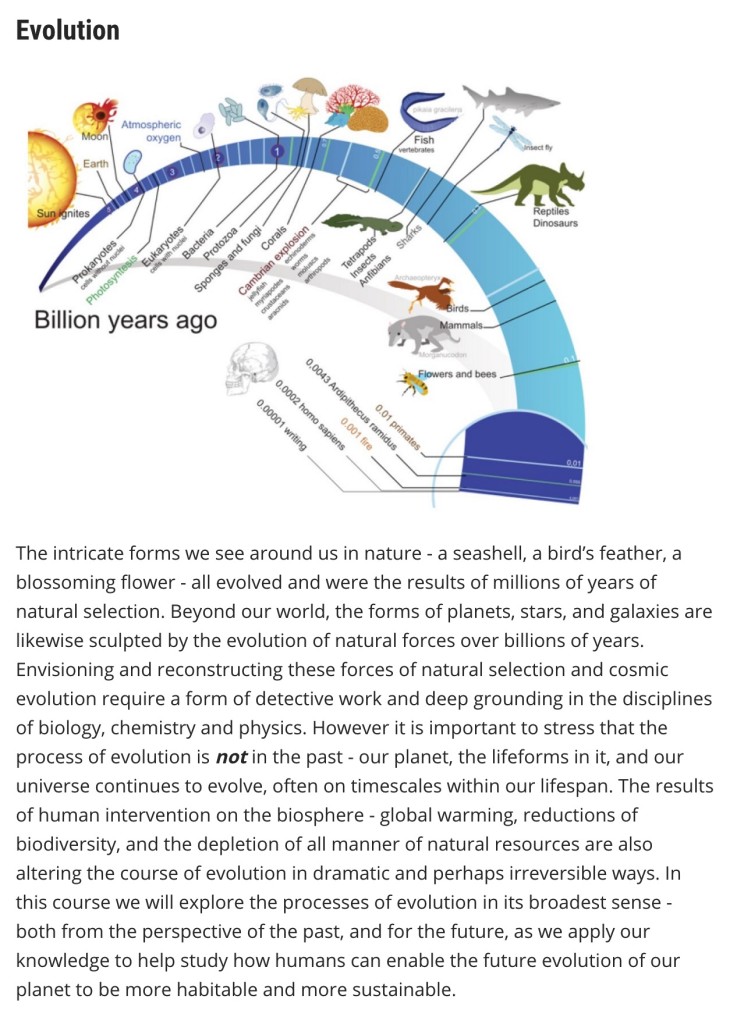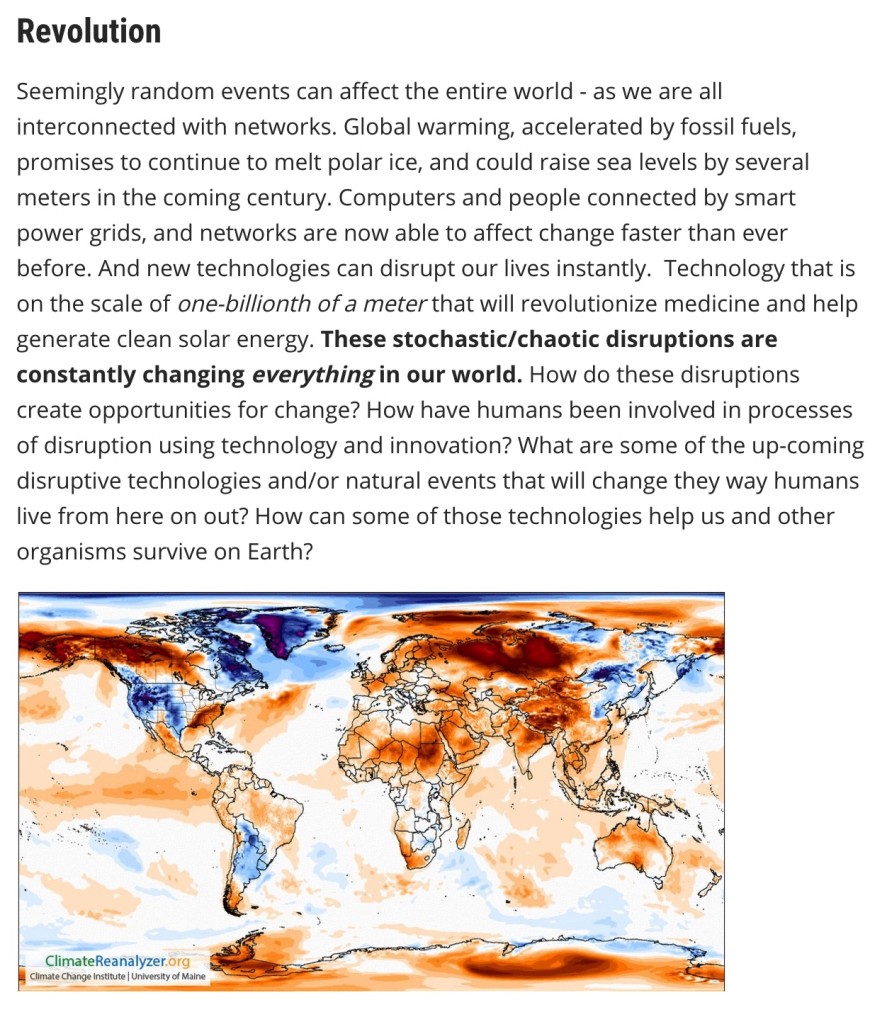While at Yale-NUS College in Singapore, I was a member of the Yale-NUS College Foundations of Science teaching team. In 2014-15, I worked with Brian McAdoo to help launch the course for its first offering. In that year we had a fantastic experience with our 16 different units on a wide range of interdisciplinary science topics. We even took the entire class – 170 students – to Langkawi Island, Malaysia for an immersive weekend where the students cruised on the rivers studying mangrove ecology, measured shoreline erosion from a tsunami, did night hikes looking for rare frogs, visited the Malaysian national observatory and looked at the Milky Way, and did experiments on the beach measuring UV radiation and looking for mathematical patterns such as the Fibonacci Series in nature.
In the 2015-16 academic year, I became coordinator of the class, and I worked with the teaching team to tighten up the disciplinary units and to align them along theme groups. As a result, we chose two themes – one was “Revolution” (disruptive technologies and disasters), and the other was “Evolution” (gradual change in nature from natural selection or physical laws). The instructors were divided into two groups of four, and we also agreed to have these groups of 20 students come together at the end in interdisciplinary teams. The teams worked in groups of four (with one student from each disciplinary group) to answer a “Grand Challenge” problem facing the world. They would then work to develop either a disruptive technology or innovation to address the challenge or design a research study to measure and characterize the problem rigorously. For 2015-16, our Grand Challenge problem was expressed in two questions:
For the Revolution theme, the Grand Challenge question was to:
“Design a new disruptive technological innovation that can be used to deal with one of the consequences of global climate change.”
For the Evolution theme, our question was:
“What are some likely future adaptations of organisms and communities to the Anthropocene?”
A more thorough course outline is below, giving the context and a description of the implementation.
Foundations of Science – Background and Overview
Yale-NUS College launched an ambitious common curriculum, which spanned two years of undergraduate education in humanities, social science, and the natural sciences. One of the key components was the year-long Foundations of Science course, taken during the second year by nearly all of the Yale-NUS students. Foundations of Science (FOS) was intended to be the main science course for non-majors in science and was an interdisciplinary exploration of science that builds upon the work students have done in the first year of the common curriculum. Science was a critical part of the Yale-NUS Common curriculum, and the FOS course was the culmination of the STEM portion of the Common Curriculum. The FOS course was designed to help students become “informed citizens of the 21st century,” as described in the Yale-NUS Common Curriculum report (Garsten et al. 2013).
FOS was a team-taught course – with eight instructors divided into two theme groups of four. Within FOS, each of the four instructors offered a 5-week “disciplinary case study” aligned within a theme area. Students took two of these 5-week case studies from their instructors, and then four groups were assembled to tackle the Grand Challenge problem. The entire teaching team of eight professors met bi-weekly to plan and review the course. The four units in each of the two theme areas are taught simultaneously to enable students to sample two of the four offerings during the semester.
For the FOS implementation in the academic year 2015-16, the two themes of the course were Evolution (the study of gradual change within the world through the laws of physics, chemistry, and biology) and Revolution (the study of sudden disruptive change through disasters and disruptive technology). The Evolution theme units were taught by instructors from the fields of Ecology, Biology, Chemistry, and Astronomy. In contrast, the Revolution theme units are taught by instructors in the disciplines of Earth Science, Physics, Computer Science and non-technology.
A listing of our instructors for the eight units within the two theme areas during Fall 2015 is below:
Evolution Theme Disciplinary Case Studies
- Antonia Monteiro – “Novel Traits” (biology)
- Jen Sheridan – “Biogeography” (field ecology)
- Stanislav Presolski – “Chemistry of Life” (chemistry)
- Bryan Penprase – “Finding and Maintaining a Habitable Planet” (astronomy)
Revolution Theme Disciplinary Case Studies
- Andrew Bettiol – “Modern Physics and the Silicon Revolution ” (physics)
- Simon Perrault – “Interaction with Mobile and Wearable Computers” (chemistry)
- Lerwen Liu – “Nanotechnology and Sustainability” (nano-technology)
- Brian McAdoo – “Earthquakes” (earth sciences)
The Grand Challenge problem was designed to enable students to apply what they have learned in the disciplinary case studies to a new context rooted in their experience and relevant to the future of society. The students are combined into diverse teams, including one student in the four discipline areas. The teams are asked to design a technology or research program to address the theme question. These Grand Challenge questions are listed below for each of the theme areas:
For the Revolution theme, the Grand Challenge question is to:
“Design a new disruptive technological innovation that can be used to deal with one of the consequences of global climate change.”
For the Evolution theme our question is:
“What are some likely future adaptations of organisms and communities to the anthropocene?”
Each of the teams then is asked to design their own research program in the case of Evolution students or to invent their own “disruptive technology” in the case of Revolution students. During Semester 2 of 2016, we offer the second semester of FOS in which students will reverse themes and take two additional disciplinary case studies. The second semester will feature a slightly different mix of instructors and topics, but within the same framework, and with a second Grand Challenge at the end of Semester 2.


